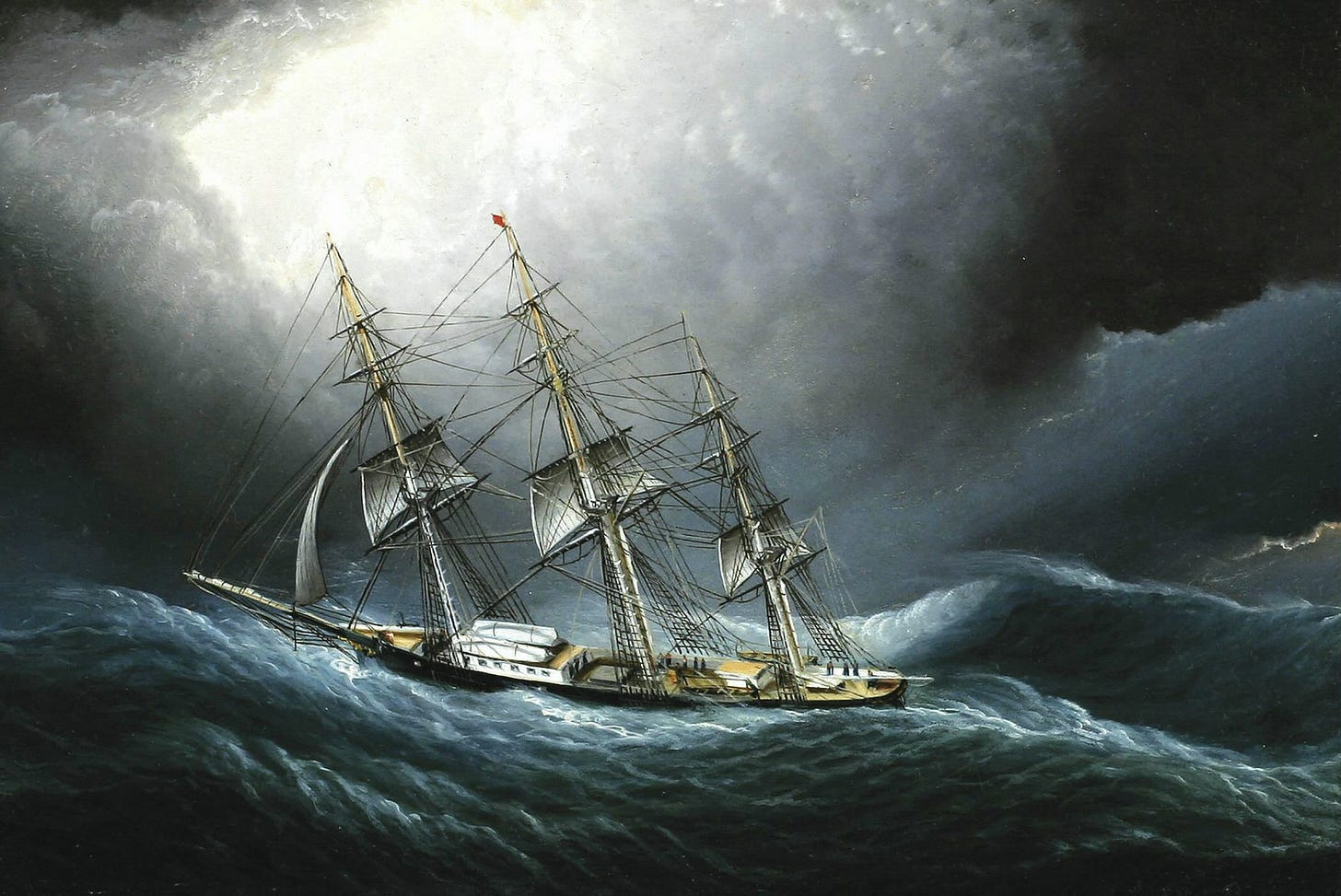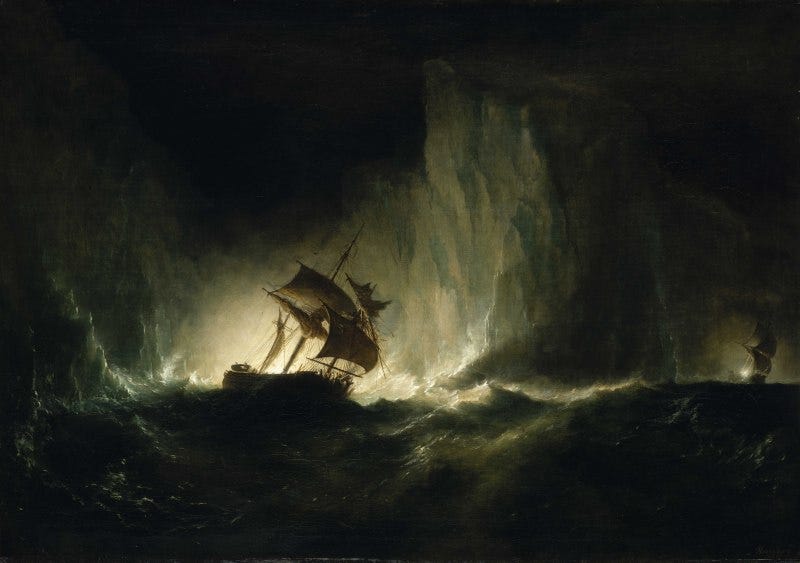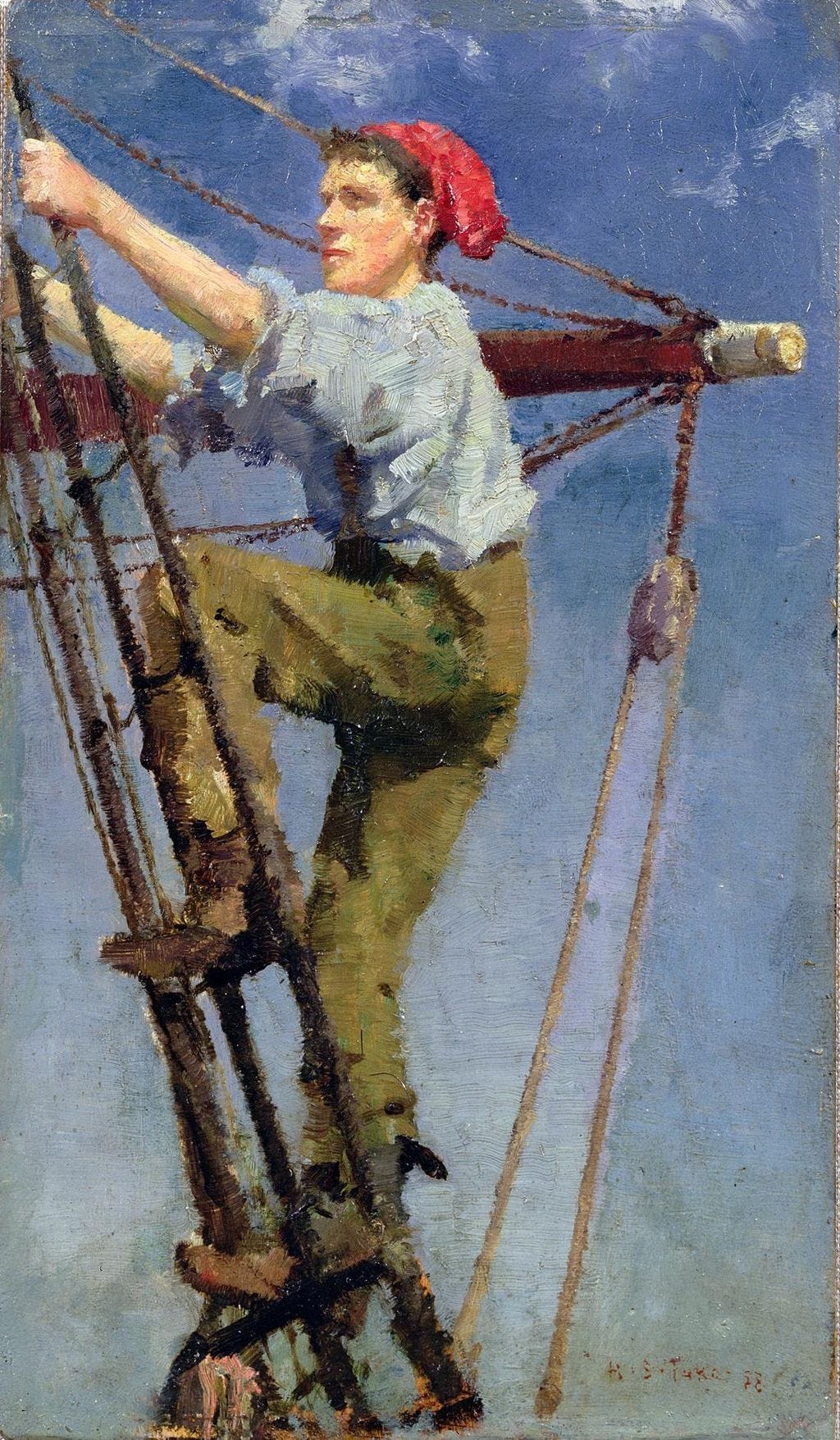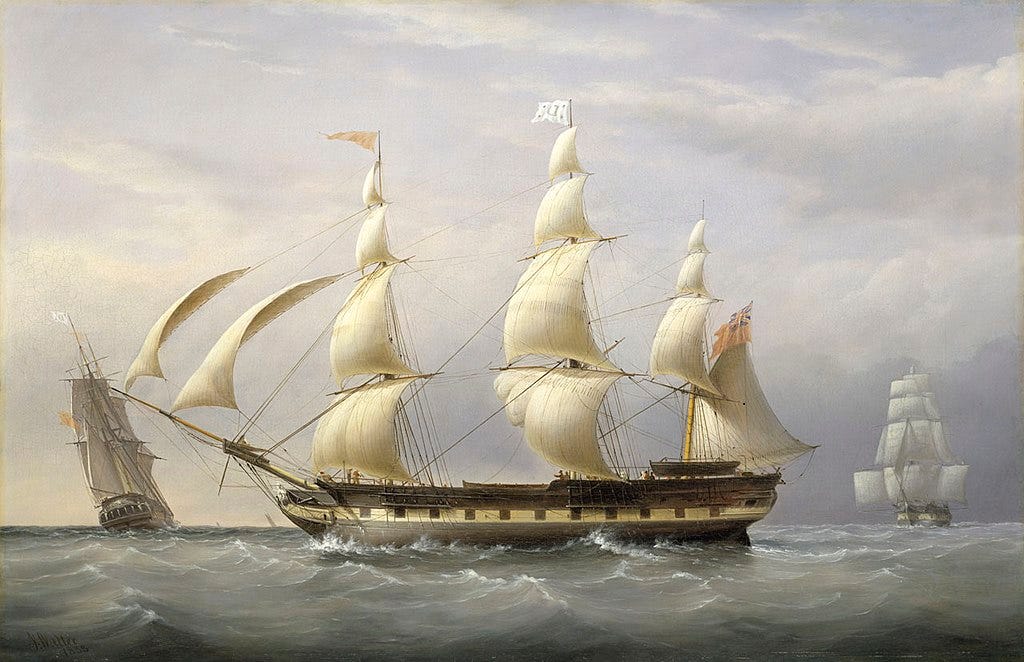Welcome to the second installment of my free serial adventure! If you don’t wish to receive these weekly (this season is only six episodes total) you can choose to only receive monthly updates in your subscription settings. Thanks, friends!
We’ll be alright if we make ‘round the horn.
Oh, we’ll be alright if we make ‘round the horn.
Yeah, we’ll be alright if we make ‘round the horn.
And we’ll all hang on behind.
The fair wind carried the Dawnswyr southward, further along the Americas. Jack Hudson found his place among Mr. Rhys’ men without trouble. Watch and watch, everything ran smoothly. Too smoothly.
As you know that sailors are generally a superstitious lot, you will not be surprised to read that the fair seas and driving winds went on for so long that the crew grew suspicious of such good luck. If they’d found themselves becalmed near the equator, furling sails in a torrential rain, fighting a gale or any other regular hardship of seamanship, they would have been less concerned. As it stood, they wondered if they would use up all the good luck allotted by the deity of sea and sky before they reached the horn.
Cape Horn. Every green sailor’s fear, a thrill to madmen. Around the southern tip of the Argentine coast, the Pacific and Atlantic waters meet in a turbulent clashing of currents.
Jack Hudson, the shantyman of the age and a sensitive soul as sailors go, found himself busy repairing a chafed line, imagining he walked along the horn’s seafloor graveyard. He had known sailors who’d perished in shipwrecks there. If he could stroll the ocean floor like a village green, he’d pay his respects to his former shipmates and walk among the strangers. He’d play them a tune for crossing into the unknown and offer to carry a message to the living.
But of course, the sea was efficient; she recycled every donation and offering the gales sent her. Jack told himself he was entirely too poetic to be a sailor and replaced his dark reverie with the humming of a tune as he worked.
And we’ll roll the old chariot along.
We’ll roll the old chariot along.
We’ll roll the old chariot along,
And we’ll all hang on behind.
****
If a man were deaf and blind on that ship, he still would have known when the Dawnswyr approached the tip of South America. The ship vibrated with the anxiety of the crew. The sea grew cold and angry, as if she were a spurned lover. The wind whipped in a new direction, so the crew would scramble up the shrouds to trim the sails accordingly. No sooner would they have the operation completed than it would switch again. Night and day, hands were called from below to assist the crew on watch. Rain poured and the waves grew higher.
One night while the boat pitched, Jack played songs below deck to keep morale up. The Dawnswyr lurched side to bow to side to stern the way only ships do. Her bowsprit would reach toward the heavens as if for rescue and her port side would dip. Only moments later, by some strange roll of motion, her bow would descend leaving her stern to be whipped by the winds of hell with the starboard side reaching for the abyss. It takes immense courage to climb aloft with the ship pitching like the Dawnswyr did as it rounded Cape Horn.
But music can produce courage in a man, like the poetry in a commander’s final speech or the bugle before the charge. Magic of the perfect cadence swells in a man’s chest and sends him hurling bravely into danger.
Jack’s fingers didn’t dance that night; they marched. Across the strings, they strode back and forth before his fellow men, adjuring the courage from deep within their souls.
Seven bells rang and the men of the middle watch stumbled out of their hammocks and shuffled about donning all the wool they could find, wet or dry. Jack left his own preparations for last, but a bell rang and all hands were called. Every man tugged his Monmouth Cap down over his ears as he hustled above.
As Jack came on deck, he heard more than one oath at the heaviness of the sail.
“Does he want to dismast us!”
“Topgallants still? Any roll could be our last! Send us right over, he will!”
“Avast that and report!” Jack stopped them, thankful the weather prevented anyone else from hearing their comments. “If you think cursing the captain bodes well for this night, you’ve got another thing coming.”
Everyone dispersed, reporting to the First or Second Mate and jumping in where needed. But Jack had to admit he was also shocked, both at the captain’s methods and the fact that they were still afloat.
“We sail a narrow course between hell and the abyss.” He said to himself under the wind.
The mates had called their hands to furl sails, but the captain wasn’t ready yet. From the lowest shrouds of the mizzenmast, Jack heard Captain Morris yell across the poop deck to Mr. Weaver.
“Not until I say! The farther she pushes us, the sooner we’ll be ‘round!”
Captain Morris stared out to sea from a well-worn spot on the poop deck. He braced himself calmly on the rails as if chaos wasn’t attempting to gulp him down. One might have thought he received an urgent message across the whitetops, so suddenly did he shout the message the entire crew was waiting to hear.
“Douse those topgallants! But only the topgallants mind you!”
The pipe sounded. The mates shouted. Every man on board had tuned his ears for that signal over the growing gale. They scurried up the ratlines and across the yards. Meanwhile, the helmsman responded like a charmed snake. Each time the captain spoke into the weather he turned the helm accordingly though it would have been nigh impossible to hear.
They painstakingly worked through the Drake passage, no longer harnessing wind but trying to escape its grasp in a roughly westerly direction. Finally, Captain Morris called for the men to douse the tops and furl the mains. The commands and answers were passed back and forth arduously. Though the wind still blew and the waves still hurled them over the seascape, every man breathed a little easier when most of the sails were in.
An alarming shout filtered down from the starboard mizzen top riggings. Of the three men who’d been working there, one man was nearly down, another followed him and had cried out. Jack Hudson was the first to see the third, evidently stuck somehow to the mizzentop yard. No sooner had the first sailor descended than Jack was up the same set of ratlines, calling to the young man.
The rain had long since drenched the sailor and the wind made a concerted effort to pull him down. Many aboard translated the wind’s sudden howls to mean if the sea couldn't have the young man, then she’d capsize the entire ship.
“We’re coming Billy, my boy! Hang on!” Hudson yelled toward the dangling sailor.
“How the hell?”
“No time for that, Grufydd. Just help me loosen this line!”
Billy Riley was hardly a boy, but he was younger than Hudson. He clung with both arms to the slippery yardarm. Mac Grufydd maneuvered around the young sailor and began to undo the rigging around the furled sail, still unable to see why Billy was stuck.
Just then, the boat tipped leeward. Billy’s hands slipped off the Yardarm.
“Riley!” Both men cried in unison.
Jack’s stomach pitched into his throat waiting for the sailor to hit the deck below. But instead, there he hung by his peacoat. Sailors’ coats were shorted to prevent them from getting tangled in lines, but Riley was thankful for the moment that he was clumsy enough to do so anyway.
“The fool lashed his coat to the yardarm!” Grufydd laughed.
“Well, no guarantee he stays in it! Grab the man’s arm while I tighten this back down. We’ll have to leave the coat and take the man!” Hudson yelled.
Of course, Grufydd was already reaching for Riley.
Once the men each had a hand and his feet were back on the stays, they discussed how to get him out of the jacket. This was no small maneuver aloft in the worst weather the horn could send them.
“Grufydd, get the buttons. We’ll get it later.”
“No! Me ole lady’ll kill me if I have to buy a new one.” Riley protested.
“Not if Davy Jones has you first!” Grufydd yelled over the gale as he continued to unbutton the jacket.
The commotion had attracted the attention of the crew. This was no small number with most of the hands on deck. They hauled the man up by his arms until he could grasp his familiar holds and shuffle back down the ratlines.
“What are you standing around for?” Mr. Rhys was the first to wake the crew from the trance of the chaotic moment. Mr. Weaver and Mr. Briggs quickly followed suit. Caption Morris nodded and resumed directing the Helmsman. The changing of the watch was executed, the evening watch dismissed below.
Billy Riley’s ration of rum was cut for a week for his foolishness. His mates more than made up for it, though in exchange for much jeering. Only a Captain can keep secrets on a sailing ship, and he did so at the heavy tax of not telling another soul. The whole story, including Riley’s exclamation about his ole lady spread quickly. Wherever he walked, hats were held inverted in a mock collection proffered to appease his “ole lady”. But of course, the pea coat merely received a good weather-washing before retrieval the next time the men set the topgallants.
Despite the apprehension of the crew, the Dawnswyr lived up to her Welsh name. The winds blew and the ocean lifted her up, threatening to dash her down. But just like a dancer, she landed aright and leaped to the next partner, romping wave to wave to a song the crew thought would never end. Thirty-six hours after Billy Riley survived hanging from the yardarm, they found themselves sailing northward on the Pacific side of the continent with a steady southwest wind.
Most of the men counted Billy’s near-death experience as bad luck enough to even things out for a while. Every watch was full of work that was never done. Jack Hudson willingly worked alongside the men unless someone after the mast instructed him to take up his fiddle.
One such afternoon near the equator, he found a new tune budding out of the magical connection between fiddle and fiddler. The crew joined in the germination of the song and this ditty was born in the nearly calm, humid air off the coast of Peru.
Old Billy Riley, Mr. Billy Riley
(Old Billy Riley, Oh) Billy Riley, Oh!
Mr. Billy Riley, oh Billy Riley, Oh!
Old Mr. Riley was a dancing master
(Old Billy Riley, Oh) Billy Riley,
Was a dancing master, oh, Billy Riley, oh!
Old Missus Riley didn’t like sailors
(Old Billy Riley, Oh) Missus Riley,
Didn’t like sailors, oh, Billy Riley, oh!
There were many more verses sung about how Mr. Billy Riley survived a dance from the yardarm on this intrepid voyage of the Dawnswyr, many of which are not fit to repeat here.
I’ve assumed that the reader is a landlubber and more concerned with the details of the crew than the ship. So, I’ve saved her description for a tranquil moment such as this. I apologize to those who would have wished to hear details sooner.
The Dawnswyr was truly a lovely ship, relatively new and well-fitted. She was a frigate of the sixth class and simply decorated in all black with one white stripe. She was one of the newest merchant ships sailing under the British flag, with three masts and twenty-four guns.
While an old ship often truly suffers from the stereotypical problems landsmen assume of them, a young ship has her own set of issues. Like a young woman coming of age, she shifts, changes, and needs constant reassurance of her maker’s good plan. There is a brief period between the bolstering maintenance of a young ship and the ‘keep ‘er afloat’ maintenance of an old ship when every captain truly believes he has the best ship in the world.
Jack suspected these to be some of the reasons ships were so often named after women. He sang softly to himself as he scrubbed the boards of the Dawnswyr’s waist.
A man can take a wife, boys.
And a man may take a mistress.
But a sailor has his ship, boys.
And his mistress is the sea.
In the back of his mind, he tossed around his unanswered questions about the ship’s purpose in the Pacific. Who owned her? Who funded a ship as proud as the Dawnswyr in such restless times? Her name was Welsh. He knew Morris and Rhys were Welsh by the thick, musical accent of their ancestral land, along with many of the crew. Weaver certainly looked Welsh, with his swarthy coloring and light green eyes, but his accent was muddy, not Welsh or English. It would be unusual if all of the officers were Welsh, but not necessarily suspicious.
“Give us a lively one shantyman!” Someone shouted from the poop deck.
“Hand this off to someone else and grab that fiddle of yours.” Mr. Briggs gave the official order looking down his porcine nose.
Jack returned with his instrument and played not only sea shanties but folk tunes from all over the empire. There was a Welsh tune he knew. He didn’t know the words, but the melody was jolly enough to work along with. He was surprised to find that nearly half of the crew sang Yr Hen Wyddeles in his stead.
The Captain watched Jack closely during this exhibition. The shantyman felt his inspecting eye. Neither did the Captain’s glances at both his First and Second Mates escape Jack’s notice. Welsh and Cornishmen made great sailors, many of them no stranger to the sea and backbreaking work. Why, then, did Captain Morris seem undesirous for it to be known that at least half his ship hailed from the Cambrian coast?
There was a time when Jack was foolhardy enough to follow curiosity down dangerous paths, when he would have pushed harder on the reactions of the Captain. Instead, he moved seamlessly to a Scottish song and then to Ward the Pirate.
“Thank goodness the British Navy has nearly done away with pirates.” A young sailor interjected after the song finished.
A palpable silence fell on that area of the deck.
“What do ya mean, mate?” Mac Gruffyd tactlessly broke the spell.
“Well, I know there’s pirates still, but not unless you go looking for them. They’re all holed up and hiding from the noose.” The teenager looked around at the men and his statement ended with a questioning higher pitch. “Right?”
“You don't know nothing, boy.” An older sailor jumped in to rebuke him. “As long as there’s a sea to sail, there’ll be pirates on her. Just shut yer mouth before you go and summon the nearest black flag, you hear?”
“Aye aye.” The boy returned to scraping the rust off the chain in front of him with reflective concentration.
“Jack, can’t you just play a jig or something?” Gruffyd asked.
Jack Hudson didn’t answer Mac Gryffud, but he did pick up his fiddle. He played a lilting melody of his own invention. Without a word, the harmonies meandered throughout the boat, above and below, ministering to each man as he had need. The liveliness of the tune renewed focus. The rolling up and down from verse to verse calmed the hearts of the unsettled. The ship fell under a charm of peacefulness. Some said it was too peaceful.








